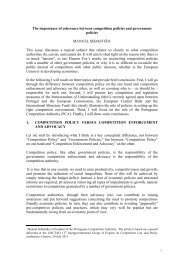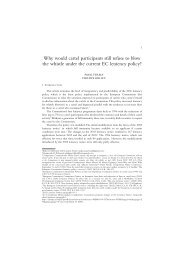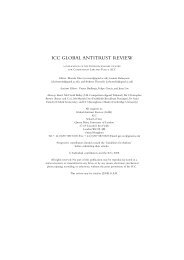GAR 2008 journal [PDF 1354 kb] - The Interdisciplinary Centre for ...
GAR 2008 journal [PDF 1354 kb] - The Interdisciplinary Centre for ...
GAR 2008 journal [PDF 1354 kb] - The Interdisciplinary Centre for ...
Create successful ePaper yourself
Turn your PDF publications into a flip-book with our unique Google optimized e-Paper software.
138<br />
GLOBAL ANTITRUST REVIEW<br />
types of remedies are strongly anticipated to be complemented by a model arbitration clause<br />
that may well be used in several merger remedy scenarios 16 . This is why the nature, the<br />
parameters, and the future prospects of the so-called ‘remedy arbitrations’ 17 constitute at<br />
present one of the most divisive and burning debates within the arbitration and competition<br />
communities in Europe.<br />
2. INTERNATIONAL COMMERCIAL ARBITRATION AND ARTICLES 81 AND 82 EC –<br />
COMPETITION ARBITRATIONS.<br />
(A) ARBITRABILITY OF COMPETITION LAW DISPUTES<br />
In general, arbitrability answers the question of what types of disputes can be submitted<br />
to arbitration. Each state, based on its sovereignty, retains the power to <strong>for</strong>mulate its own<br />
answer to this question according to the public policy considerations prevailing at a certain<br />
time within its domain. Indeed, as noted by some commentators, ‘arbitrability determines<br />
the point at which the exercise of contractual freedom ends and the public mission of<br />
adjudication begins.’ 18<br />
Albeit highly controversial in the past, the arbitrability of competition law disputes is<br />
now generally acknowledged on both sides of the Atlantic. In the USA, the arbitrability of<br />
competition law has not been debated since the dust of Mitsubishi 19 case settled. In the EC,<br />
the arbitrability of EC competition law was implicitly yet doubtless confirmed in the<br />
seminal judgment of the European Court of Justice (ECJ) in Eco Swiss 20 , where the ECJ also<br />
underlined the Member States’ interests in the sound and effective operation of arbitration. 21<br />
EC law aside, the current legislation and jurisprudence of the leading European<br />
jurisdictions clearly gravitate in the same direction. 22<br />
It is important to stress at this point that when referring to the arbitrability of<br />
competition law, one invariably focuses on the ‘civil’ aspect of competition law, namely on<br />
Notice on Remedies, i.e. Commission Notice on remedies acceptable under Council Regulation (EEC) No 4064/89<br />
and under Commission Regulation (EC) No 447/98, OJ 2001 C68, remains in <strong>for</strong>ce.<br />
16<br />
J. Luebking,‘Revision of the Notice on Merger Remedies’, (2007), 2 Competition Policy Newsletter 6, at 8-9.<br />
17<br />
As made clear above, arbitration commitments may arise not only in the context of the Merger Regulation and its<br />
remedies scheme, namely the Commission’s merger-related decisions declaring certain concentrations to be<br />
compatible with the common market subject to specific conditions, but also in the context of the Modernisation<br />
Regulation, and in particular its Article 9, which clearly, though tacitly, invites arbitration commitments within the<br />
scope of the Commission’s Article 81(3) EC individual exemption clearance decisions. Such arbitration scenarios are<br />
generally termed ‘remedy arbitrations’ or ‘EC remedy-related arbitrations’.Although the present paper is confined to<br />
the analysis of the <strong>for</strong>mer type of remedy arbitrations, the same analysis applies mutatis mutandis to the latter type as<br />
well. For a very recent use of an arbitration commitment in a decision under Article 9 of the Regulation 1/2003 see<br />
Case Comp/37749 Austrian Airlines and SAS AB.<br />
18<br />
See Carbonneau and Janson,‘Cartesian Logic and Frontier Politics: French and American Concepts of Arbitrability’,<br />
(1994), 2 Tulane Journal of International and Comparative Law 193, at 194.<br />
19<br />
Mitsubishi Motor Corp. v. Soler Chrysler-Plymouth, Inc., 473 US 614 (1985).<br />
20<br />
Case C-126/97 Eco Swiss v. Benetton [1999] ECR I-3055.<br />
21<br />
Ibid, para 35.<br />
22<br />
For a comparative survey see P. Landolt, above note 7, Chapter 5. See also D. Rahmann, ‘Arbitrability of Antitrust<br />
Issues’, (1990), 12 Comparative Law Yearbook of International Business 97.


![GAR 2008 journal [PDF 1354 kb] - The Interdisciplinary Centre for ...](https://img.yumpu.com/36860029/148/500x640/gar-2008-journal-pdf-1354-kb-the-interdisciplinary-centre-for-.jpg)

![GAR 2009 journal [PDF 592kb] - The Interdisciplinary Centre for ...](https://img.yumpu.com/43872044/1/184x260/gar-2009-journal-pdf-592kb-the-interdisciplinary-centre-for-.jpg?quality=85)
![Law, markets and globalization (David J Gerber) [PDF 371kb] - The ...](https://img.yumpu.com/35387890/1/184x260/law-markets-and-globalization-david-j-gerber-pdf-371kb-the-.jpg?quality=85)

